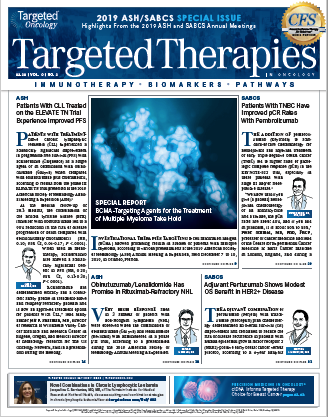ADC, CAR T-Cell Therapy Push DLBCL Into Spotlight at ASH Conference
Clinical trial findings presented during the ASH annual meeting have the potential to change the management of diffuse large B-cell lymphoma, according to John M. Burke, MD.
John M. Burke, MD

As the new co-Editor in Chief of Targeted Therapies in Oncology™ (TTO), I am excited and honored to be working alongside Dr Robert Ferris and the entire team at TTO. My clinical practice focuses on hematological malignancies, and what better issue for me to start on than one focusing on the 2021 American Society of Hematology (ASH) Annual Meeting. In recent years at the ASH conference, diffuse large B-cell lymphoma (DLBCL) has taken a back seat to other hematological malignancies.
This year at ASH was different. Two major developments have the potential to revolutionize the management of DLBCL in more than 2 decades. The first development was the POLARIX trial (NCT03274492). In the trial, patients with previously untreated DLBCL were randomly assigned to either R-CHOP (cyclophosphamide, doxorubicin, vincristine, prednisone) chemotherapy, or the anti-CD79b antibody-drug conjugate polatuzumab vedotin (Polivy) plus R-CHP (pola-R-CHP). Pola-R-CHP improved progression-free survival and reduced the need for additional antilymphoma therapy; however, the complete response rate and overall survival were not affected.
The second major development was the investigation of chimeric antigen receptor (CAR) T-cell therapy in the management of first relapse of DLBCL. Three studies compared CAR T-cell therapies with conventional high-dose chemotherapy and autologous stem-cell transplantation in patients whose DLBCL had relapsed within 12 months of their initial therapy. In the ZUMA-7 trial (NCT03391466), axicabtagene ciloleucel (axi-cel; Yescarta) improved event-free survival (EFS) and response rates. In the TRANSFORM trial (NCT03575351), lisocabtagene maraleucel (liso-cel; Breyanzi) improved EFS, progression-free survival, and the complete response rate. Paradoxically, however, in the BELINDA trial (NCT03570892), tisagenlecleucel (tisa-cel; Kymriah) did not improve EFS or the response rate compared with standard therapy.
Taken together, these results have the potential to change the management of DLBCL. Whether the standard of frontline R-CHOP followed by high-dose chemotherapy and autologous stem-cell transplantation for first relapse will change in practice may depend on regulatory approvals of these products, reviews by panels of experts writing guidelines and pathways, the ability to manufacture products and deliver them to appropriate patients in a timely fashion, and the ability of society to pay for the costs of these novel agents.
Survivorship Care Promotes Evidence-Based Approaches for Quality of Life and Beyond
March 21st 2025Frank J. Penedo, PhD, explains the challenges of survivorship care for patients with cancer and how he implements programs to support patients’ emotional, physical, and practical needs.
Read More













